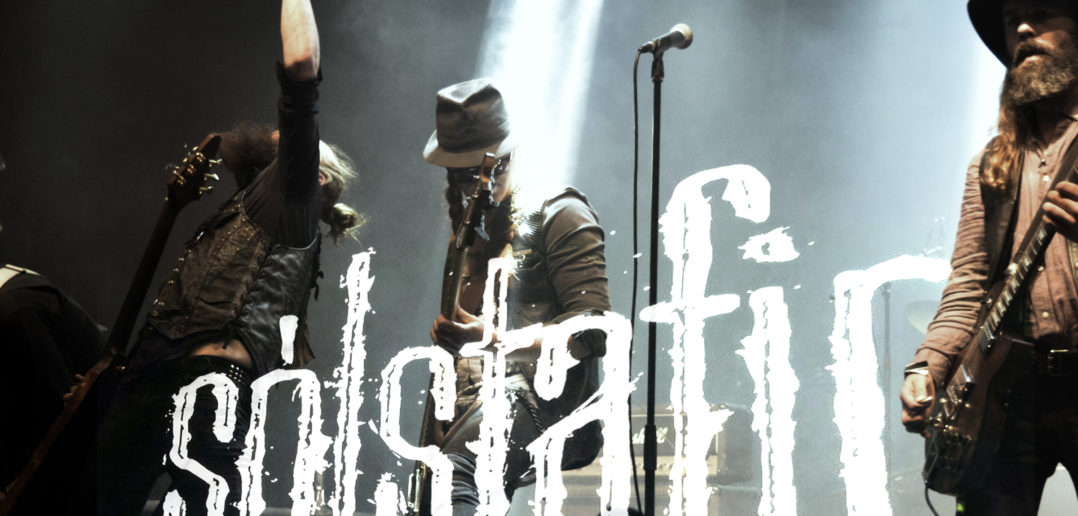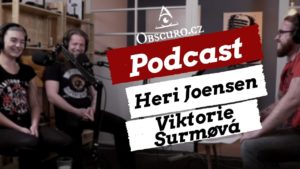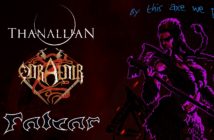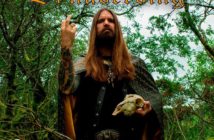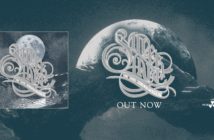Solstafir are cult because they are unique. I would not know of any other band like them. Perhaps their music sounds even weird to many people. They describe their music as Pink Floyd metal.
 My personal history with Solstafir started when I noticed that some of (my favourite) musicians wore their shirts quite some years back. In the very first moment, I wouldn’t even know, what Solstafir is. And when I finally checked out their repertoire I fell in love with their emotional and stirring tunes, this voice that seems to crawl deep into your soul and the gloomy atmosphere that even bright passages of their songs possess.
My personal history with Solstafir started when I noticed that some of (my favourite) musicians wore their shirts quite some years back. In the very first moment, I wouldn’t even know, what Solstafir is. And when I finally checked out their repertoire I fell in love with their emotional and stirring tunes, this voice that seems to crawl deep into your soul and the gloomy atmosphere that even bright passages of their songs possess.
The Prophecy Fest – a small festival in a cave (Balve) in the heart of Germany announced them as headliner for their first day. And a festival in a cave alone was an inviting and promising idea.
So I met Adalbjörn after their gig in the middle of the night, when we had the cave nearly for ourselves. He lights a smoke as we start. The band has arrived only in the evening from their gig at the Slovenian Metal Days in the most picturesque scenery of Tolmin. But then, this means a long journey into the rural heart of Germany. „Yeah, we flew in but we had to start travel at six in the morning and we were here around seven so it looks like a thirteen hour travel? Yeah! But we’re here and this gig was fun.“ I agree „Oh yes, that gig was awful.“ Adalbjörn looks irritated. Ok. I am tired as hell. So I don’t get it. What’s wrong, I wonder. – I got up at the same time as the band and started working in my day job at half past six before driving to the venue, shooting the shows and now – at some time after 2:00 am – meeting Adalbjörn. „Especially the double features were really, really great“, I continue. „Did you mean awesome or aweful?“ he asks in return. I am even too tired to really blush although in this very moment I feel pretty ashamed. ‚Damn‘, I think. All I manage is a low and shy „Awesome, of course.“ I laugh and explain, that I am very tired as well. „I know“, my interviewee, returns a smile.
I check my questions. „Do you prefer the festivals or the clubs?“ – „Both! Both. It’s so different. I like big stages. I like audience that is not necessarily our audience. You get to win them over and we do also do all sorts of festivals, metal festivals, alternative festivals and it’s nice to see that the metal people still like us. That’s great. It’s also nice to play for non-metal heads to see that they like this kind of music. The club shows are more like our people. So they travelled here to meet us and we do more intimate shows. So, I like both.“
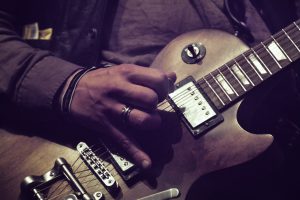 During the summer I had met very different types of musicians. Some where very classical metal heads while others pointed out that they were not only metal heads and others seemed to be more metal although on first sight one might not have considered them being fond of metal music or way of life or thinking at all. So during one of the corresponding shows I started wondering what metal is. And when I saw the shows earlier, especially the double features with GlerAkur this question popped up in my head again. „What is metal to you? Is it a type of music? Is this a kind of attitude? Is this something totally different?“ He chews his lip while I explain my thought. „I don’t know. It’s …. I turned 40 the other day, and I guess I started listening to metal music around when I were twelve. So the kid that fell in love with metal is not the same man it is today. So it’s a little bit different. It’s a long time since I fell in love with heavy metal. And I don’t know but as 40 year old I can more relate to the 22 year old than the twelve year old. I don’t know … When I heard the soloo/the lead guitar in ‚Angel of Death‘ (Reign of Blood/Slayer) when I was like 12, it was beyond words. I find it really hard to explain what it is.“ He takes a moment to think and starts over a couple of times apparently still not happy with the words that come to his mind. „It’s a wide term, I mean. AC/DC is not metal but related to it. And This Lizzy – it’s not really metal. But … one aspect of Rock’n’Roll really. And I started this Guns’n’Roses, AC/DC – that’s also Rock’n’Roll. And then came of course Metallica and Slayer and that’s of course, metal bands. But all in all the same feeling to it.“
During the summer I had met very different types of musicians. Some where very classical metal heads while others pointed out that they were not only metal heads and others seemed to be more metal although on first sight one might not have considered them being fond of metal music or way of life or thinking at all. So during one of the corresponding shows I started wondering what metal is. And when I saw the shows earlier, especially the double features with GlerAkur this question popped up in my head again. „What is metal to you? Is it a type of music? Is this a kind of attitude? Is this something totally different?“ He chews his lip while I explain my thought. „I don’t know. It’s …. I turned 40 the other day, and I guess I started listening to metal music around when I were twelve. So the kid that fell in love with metal is not the same man it is today. So it’s a little bit different. It’s a long time since I fell in love with heavy metal. And I don’t know but as 40 year old I can more relate to the 22 year old than the twelve year old. I don’t know … When I heard the soloo/the lead guitar in ‚Angel of Death‘ (Reign of Blood/Slayer) when I was like 12, it was beyond words. I find it really hard to explain what it is.“ He takes a moment to think and starts over a couple of times apparently still not happy with the words that come to his mind. „It’s a wide term, I mean. AC/DC is not metal but related to it. And This Lizzy – it’s not really metal. But … one aspect of Rock’n’Roll really. And I started this Guns’n’Roses, AC/DC – that’s also Rock’n’Roll. And then came of course Metallica and Slayer and that’s of course, metal bands. But all in all the same feeling to it.“
„You’ve been to the metal community in different places. Is it the same or do they vary very strongly?“ – „You mean between Rock’n’Roll and metal?“ Apparently Adalbjörn is still thinking on my last question, perhaps not really happy with the explanations he has found. Yet my aim with this question was a different one intending to learn about cultural differences within the metal community around the world. „I mean is the community the same?“ I end my illustration: „Yeah. Really, I would say it is“, he says passionately. „The way I look at heavy metal genre, the people, the kids it’s more like outcasts. It’s not the guy that fucked the prom queen in an American teenage movie“, Adalbjörn explains and I agree smiling. „It’s not the quarter back in American football team. It’s more like the gigi guys that find friends in each other. Or I found. It’s sort of my friends I found that and I still have. Most of my friends I have since I was twelve. They’re like the shy guys that didn’t have a chance of talking to girls. Or didn’t play football. So sort of we group up. And I see it like that, you know, the bigger, the fatter, the more bearded the guy is – the biggest heart ever!“ ‘So that is metal to Adalbjörn’, I think with a big smile and I fully agree: „Yeah, mostly it is like that.“
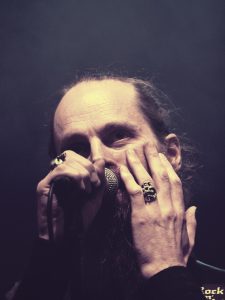 „You’ve seen quite likely a lot of other bands, too, during this rather long tour. I think you’ve been touring already like six or seven weeks? What does it take for another band to impress you if you’re not on stage yourself but somewhere in the audience or happen to be around from where you can watch and listen?“ He sighs thoughtfully. „It’s a good question. Not many bands do that today.“ He remains silent for some more seconds before he asks, „well, if you see in metal or in music?“ – „Whatever.“ – „If I see Nick Cave, over 60, doing albums that are still valid or I can say, kick ass – amazing; in top form. That impresses me. When Neil Young is 75 or something playing ‚Rockin‘ in the free world‘ for 25 minutes, breaking his strings – that is impressive. And people can come up with something new. When people can actually be themselves, and even though it could look ridiculous or something that’s another thing that impresses me.“
„You’ve seen quite likely a lot of other bands, too, during this rather long tour. I think you’ve been touring already like six or seven weeks? What does it take for another band to impress you if you’re not on stage yourself but somewhere in the audience or happen to be around from where you can watch and listen?“ He sighs thoughtfully. „It’s a good question. Not many bands do that today.“ He remains silent for some more seconds before he asks, „well, if you see in metal or in music?“ – „Whatever.“ – „If I see Nick Cave, over 60, doing albums that are still valid or I can say, kick ass – amazing; in top form. That impresses me. When Neil Young is 75 or something playing ‚Rockin‘ in the free world‘ for 25 minutes, breaking his strings – that is impressive. And people can come up with something new. When people can actually be themselves, and even though it could look ridiculous or something that’s another thing that impresses me.“
We have been found. It’s getting busy around us suddenly. A drunken woman shows up. She wants me to take a photo of her and Adalbjörn. A man follows thanking for the great show in well prepared Icelandic. And then one of the organizers appears thanking Adalbjörn in a long monologue, making sure each detail of his gratitude is expressed exceesivley, no compliment to the musician spared, ignoring Adalbjörn’s in the beginning very polite, later more direct tries to continue our interview. The organizer was nervous apparently so that to me the situation is somewhat entertaining although, of course, reducing my interview time. In the middle of the night, after a long day no one is capable of endlessly focussing on conversations. … save perhaps this event manager.
„We were speaking of the impressive stuff…“ – „Yeah, sometimes I hear in general, I hear a song that I think: I wish I wrote this song! It can be all sorts of music. Pop. Rock. Metal. Or …. I don’t really go to shows anymore. Because I sort of related that to being … when you tour this much, … “ – „It’s like work-related?“ – „Yeah. Yea, I went to Metallica the other day. And I am seeing them in Glasgow a couple of months ago. But going to gigs I don’t really doing this anymore but sometimes when I do I’ll be very inspired.“
I met Adalbjörn only a few days after the suicide of Chester Bennington (20th July 2017). At this time there was also a video showing a very desperate and potentially willing to commit suicide Sinead O’Connor (‘Nothing Compares 2 U’) on youtube. During the show, Adalbjörn took his time to announce ‘Necrologue’ in a long and very touching speech addressing us all – individually. It deals with the suicide, as final way out of depression committed by a fan Solstafir had known for long time before that. So I wonder if the this song, especially as it is introduced with something like, ‚we wouldn’t play this for many years‘ has been taken into the set list due to the recent events. But I fail making my point clear. And Adalbjörn relates to the time left for shows on festivals or headlining shows: „No, we’re doing mostly like 70 minutes but we can go to 60 minutes, we go to 90 minutes. So most of the songs are the same. We have a few to add here and there. If we do headline shows, we do two-hour shows. So most of it … well for this year, we changed the whole core of the set list. Last year, there was a different core. And next tour we will change the core again. So now we’re doing like two new songs, next time we might do like five new songs on the next tour.“ Somehow it feels wrong to try moving the topic towards my actual intention so I move on.
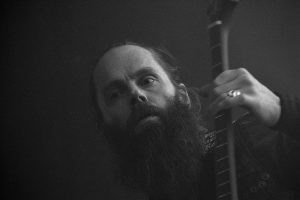 „It is a bit more of complex phrase, so I read out my question: I have often read that the unique Icelandic nature is of crucial importance to your music. One of the strongest forces in Iceland surely is the omnipresent volcanism which is metaphorically spoken a kind of landscape sculpturing phoenix bearing the power of rebirth as much as decay or destruction. So I wonder if you could describe the role of the omnipresence of this ephemeral power for your music.” – „We get this sort of questions a lot“, he begins. „I think the question is more complex than the reality we live in. It’s very natural to us to have the volcanoes around us and sometimes there’s earthquakes. There are hundreds of earth quakes in Iceland every day. Most are really small. But sometimes they get big. But we are used to it. We grew up with having danger of earthquakes, I have grown up with the risk of an eruption. But only once in my life we had to close down the windows because there was so much ash in Reykjavik. I grew up in a little fishing village. There was the risk of avalanches at all times. But it is so natural to us. I guess it is like you live in Australia you know there is a risk of venomous spiders and snakes. It’s very natural to us to have this awareness. And I guess it makes us who we are. I can jump in my car and drive like 12 minutes and I am on the fucking moon and in an earth quake area. So there is a lot of this desolate stuff. It forms our mentality. Cause the songs are not really written in the part of nature. It comes from within. Not from our surrounding. They come from within. You write what you heard, what affected you, what inspires you. You can go more deep into this. You can go even more spiritual, you know. But the spiritual you talk you sound a bit coo coo.“
„It is a bit more of complex phrase, so I read out my question: I have often read that the unique Icelandic nature is of crucial importance to your music. One of the strongest forces in Iceland surely is the omnipresent volcanism which is metaphorically spoken a kind of landscape sculpturing phoenix bearing the power of rebirth as much as decay or destruction. So I wonder if you could describe the role of the omnipresence of this ephemeral power for your music.” – „We get this sort of questions a lot“, he begins. „I think the question is more complex than the reality we live in. It’s very natural to us to have the volcanoes around us and sometimes there’s earthquakes. There are hundreds of earth quakes in Iceland every day. Most are really small. But sometimes they get big. But we are used to it. We grew up with having danger of earthquakes, I have grown up with the risk of an eruption. But only once in my life we had to close down the windows because there was so much ash in Reykjavik. I grew up in a little fishing village. There was the risk of avalanches at all times. But it is so natural to us. I guess it is like you live in Australia you know there is a risk of venomous spiders and snakes. It’s very natural to us to have this awareness. And I guess it makes us who we are. I can jump in my car and drive like 12 minutes and I am on the fucking moon and in an earth quake area. So there is a lot of this desolate stuff. It forms our mentality. Cause the songs are not really written in the part of nature. It comes from within. Not from our surrounding. They come from within. You write what you heard, what affected you, what inspires you. You can go more deep into this. You can go even more spiritual, you know. But the spiritual you talk you sound a bit coo coo.“
Once more I have the impression that he is still busy with before last question, searching for his actual reply and finding it by a slightly moved perspective in the new question: „Is the culture historic part of the Icelandic history part of the music, too? Or is it the same more like latent influence?“ – „Yeah“, he beginns while I am still speaking in a long sound, „I don’t know because we so much going into personal stuff and nature stuff. Nature is more like who we are. Not what we do. We write the most stuff of what we do and how we experience life. So we have this one song on the album about avalanche. That happened 15/10 years ago. Most of it is about stuff you come across in life. Death or depression. You know, heart being crossed. All sorts of stuff. So it’s more, it’s closer, it’s closer to you know lyrics.“
 „I did an interview lately that made me think a lot. My interviewee had a death experience and he said, death is too simple to put into words. If you try to put your experience, your emotions into words, have you come to the point at which you thought language and words are not enough to express what you feel?“ – „Yeah. There is a song on the album that is about domestic violence. So when someone tells you the story, it’s someone close to you who tells you the story and the person cannot even say the words out loud, you fill in the gaps and it takes a long time to get something out of the person. The brain has just to go into a shot-down mode while you talk about it. I never played this song live. It’s hard for me to listen to it because it’s really ugly, tragic things. So I don’t know what it’s gonna be like when I start singing it. … Sometimes I can listen to it. And I am only scratching the surface. The stuff under the surface is really so … I listen to it, it’s just scratching the surface because the brain is not connecting to all the disgusting facts of this fucking drama. It happened.“
„I did an interview lately that made me think a lot. My interviewee had a death experience and he said, death is too simple to put into words. If you try to put your experience, your emotions into words, have you come to the point at which you thought language and words are not enough to express what you feel?“ – „Yeah. There is a song on the album that is about domestic violence. So when someone tells you the story, it’s someone close to you who tells you the story and the person cannot even say the words out loud, you fill in the gaps and it takes a long time to get something out of the person. The brain has just to go into a shot-down mode while you talk about it. I never played this song live. It’s hard for me to listen to it because it’s really ugly, tragic things. So I don’t know what it’s gonna be like when I start singing it. … Sometimes I can listen to it. And I am only scratching the surface. The stuff under the surface is really so … I listen to it, it’s just scratching the surface because the brain is not connecting to all the disgusting facts of this fucking drama. It happened.“
„Is it painful to write this stuff, also? I mean you need to get into the story to have a feeling for it and to find the wording.“ – „Sometimes … hm, this lyrics came to me really easy, this song of domestic violence. When I start with writing lyrics I think it’s really difficult, I could probably write with the guys a 25-minutes song in two hours. But writing lyrcis. 14:36 That is tough. Days. Weeks. All to writing one lyric. It’s difficult. But the more personal, and the more painful so it’s difficult to express. Like you said: you can see the painting but it’s difficult what words you gonna use for it. So you gonna choose your words carefully. Because you’ll be singing it for a long time. And you sort of letting people know what you think. You can’t tell people everything what you think. That would lock you up.“
I follow the idea of lyrics and their message and how to put that into words to the point of which language is for which reason the appropriate one for Solstafir. This would be Icelandic. I learned earlier that lyrics in the mother tongue are considered to be understood by the heart from the audience at home. So I wonder if Solstafir feel different to play at home where they would be completely understood to playing abroad. „Very much different“, he says thinking for another few seconds. Icelandic gigs are usually the most difficult gigs. This gig today, it was not difficult. We loved it. But it was not difficult at all. If this would have been at home it was a lot more difficult. Because, you know, people know who you are. At most of the gigs there will be lots of friends also there. They relate some topics to: ‚is it this guy? This guy? This girl?‘ So why are you singing about this? It happened 25 years ago. And you never spoke about this.‘ …Yah“ I see the point very clearly and become aware how small the number of Icelandic people is. It must very easy feel like you would know everybody in the audience if you have been in the scene for so many years in such a small community.
 I am back once more to the genre question. You will know already that I am not fond of genres and Solstafir’s music is hardly to be categorized otherwise than Solstafir’s music. I wonder if it is a conscious decision of the band to bridge genres and in general thinking in boxes with their music. I hear a passionate „Yeah! We hate rules in music. Boring. Most of my favourite bands are more simple bands such as AC/DC. But genres – I don’t look at them. They don’t even exist for me. We can have a song that is pop-influenced. Then we have a full blown D beat discharge running in the middle. However, if we don’t accept these rules. And we don’t even use verse chorus. A lot of musicians use them when they compose music. Whatever feels right, whatever is cool, as you know, you enjoy playing it, it brings you to a certain mood, if you can play the riff for half an hour, than you know it’s a good riff. We have tried sometimes and checked out to write shorter songs but it’s like too difficult. That’s challenge. A short song. I cannot do that.“ I frown as it reminds me of the difficulties in writing a catchy yet complete summary and so I mention it, adding that too much information cannot be included. „Yeah“, he says agreeing. „It’s like taking a movie and cutting it down to four minutes.“
I am back once more to the genre question. You will know already that I am not fond of genres and Solstafir’s music is hardly to be categorized otherwise than Solstafir’s music. I wonder if it is a conscious decision of the band to bridge genres and in general thinking in boxes with their music. I hear a passionate „Yeah! We hate rules in music. Boring. Most of my favourite bands are more simple bands such as AC/DC. But genres – I don’t look at them. They don’t even exist for me. We can have a song that is pop-influenced. Then we have a full blown D beat discharge running in the middle. However, if we don’t accept these rules. And we don’t even use verse chorus. A lot of musicians use them when they compose music. Whatever feels right, whatever is cool, as you know, you enjoy playing it, it brings you to a certain mood, if you can play the riff for half an hour, than you know it’s a good riff. We have tried sometimes and checked out to write shorter songs but it’s like too difficult. That’s challenge. A short song. I cannot do that.“ I frown as it reminds me of the difficulties in writing a catchy yet complete summary and so I mention it, adding that too much information cannot be included. „Yeah“, he says agreeing. „It’s like taking a movie and cutting it down to four minutes.“
As the band mates signal that it is time to leave the venue I come to my final question. I introduce it carefully. You never know if you dig too deep into privacy asking for the invisible friend and fictional adventures from the childhood days. „I hate to disappoint you“, Adalbjörn replies frowning. „Because this passage would be a lot more sexy if I told you I had one.“ I smile in reply and say: „Well if you had none then you had none. That’s just it.“ – „No. I lived in a small fishing village. So I loved my friends who just lived just in the next street. No, I never really had … no. I’m mixing it up with children’s book where the main character had an imaginative friend. I didn’t.“ – Could this passage be anymore sexy? I don’t think so. It is authentic and even more appreciative and showing respect for my doing. Full compliance and even trying to dig some even ‘better’ reply from the depth of memory in reply of such question proposed in the hurry of the band mates waiting! Chapeau! And thank you so much!
We take our farewells and Adalbjörn excuses once more for the late time and that communication was not perfect. This is very polite and I see my doing yet more appreciated. Nevertheless, I see no reason for excusing. The band has toured for a long time and travelled a long way today. Festivals tend to be a bit unpredictable, and as we had in the end a great conversation I am very happy we could make it happen at all. Therefore at which time has no meaning.
 One of my major motivations in promoting bands by doing interviews is appreciation of what they do. There is a general lack in appreciation, even more as art is too often considered to come for free – free not only of charge, but more tragically free of appreciation and without a respectful feedback to the artist. Adalbjörn took his time to consider my questions. Several times he seemed to stick to one question to reply it only later to his own confidence. In other words these questions were worth thinking of them, even a little longer. I take it a big compliment and inspiration to go on. Appreciation goes either way here!
One of my major motivations in promoting bands by doing interviews is appreciation of what they do. There is a general lack in appreciation, even more as art is too often considered to come for free – free not only of charge, but more tragically free of appreciation and without a respectful feedback to the artist. Adalbjörn took his time to consider my questions. Several times he seemed to stick to one question to reply it only later to his own confidence. In other words these questions were worth thinking of them, even a little longer. I take it a big compliment and inspiration to go on. Appreciation goes either way here!
As we find it easy to remember what is said in the end: Adalbjörn announced ‘Necrologue’ with a passionate statement to take care of our friends and family – all the more if they are fighting depression or addiction. He said each of us could be the one making the difference for that one person in the end not seeking relieve in suicide, as we were there to listen. Agreed. Let’s go for it.

